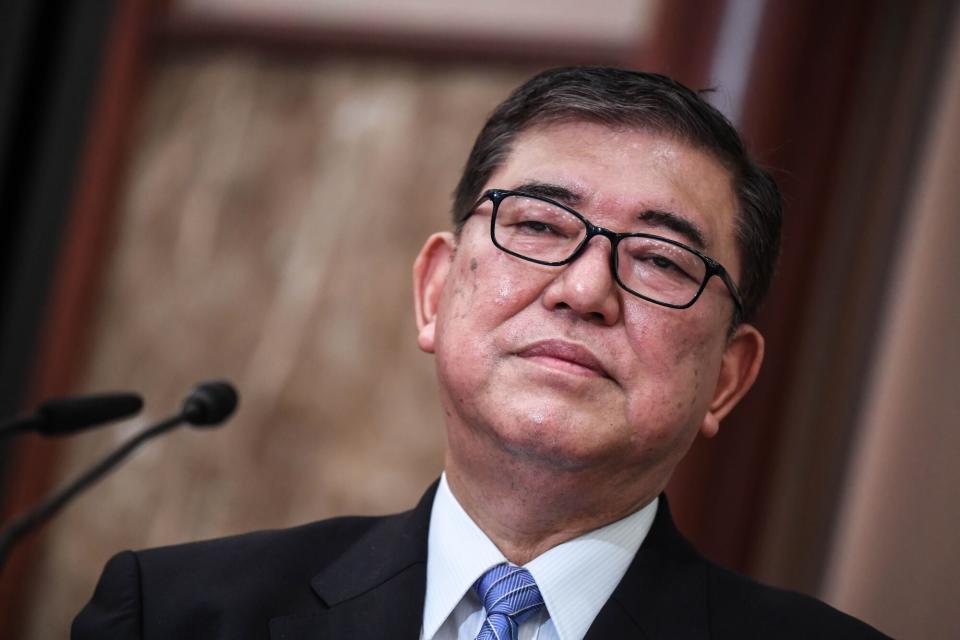Twin Japan Disasters Present Fresh Hurdles for Troubled PM
(Bloomberg) -- The year is off to a bad start for Japanese Prime Minister Fumio Kishida, with a devastating earthquake and a deadly plane crash adding to the litany of challenges he faces at home and abroad.
Most Read from Bloomberg
Boeing Max Grounding Goes Global as Carriers Follow FAA Order
A Boom, a Whoosh, a Flicker: ‘I Started to Text My Loved Ones’
Already battling a political fundraising scandal, record-low public disapproval and geopolitical risks, Kishida finds himself overseeing a protracted rescue operation following a New Year’s Day earthquake, with more than 80 dead and nearly 200 people still missing. His government is also seeking answers to a plane collision at Tokyo’s main airport Tuesday, which resulted in five deaths and a passenger jet bursting into flames.
Before the twin tragedies, there was already speculation Kishida’s days as premier may be numbered as he spent much of the final weeks of 2023 hobbled by Japan’s widest-ranging political scandal in decades, which helped push disapproval of his cabinet to the highest since 1947 in one major poll.
Read more: Kishida’s Support Tanks After Replacing Scandal-Hit Cabinet
The next few months could be a make-or-break moment for the prime minister. He faces two key events in March: Passage of the national budget in a parliament dominated by his ruling Liberal Democratic Party and a potential state visit to the US, which is likely to either bolster his approval rating or clear the way for him to step aside.
“The dominant view is that he’ll probably hang on until the budget is passed,” said Gerald Curtis, a professor emeritus at Columbia University and author of several books on Japanese politics. “And then he’ll have to resign.”
Parliamentary approval for the budget usually comes in late March. Depending on what further details emerge from the investigation, Kishida could step down even sooner, Curtis added.
The premier on Thursday pledged to do everything he could to restore the public’s trust. He also pushed an all-out effort to help those struggling to recover from the powerful quake that toppled buildings, destroyed homes and upended the lives of tens of thousands.
Scrutiny of his government is expected to grow more intense as he handles one of the worst natural disasters to hit the country in years.
But it could also provide an opportunity to demonstrate his leadership by sending aid to more than 33,000 evacuees from the quake-hit area where water, food and shelter are in short supply.
Meanwhile, authorities piecing together why a passenger jet collided with a coast guard plane that was meant to deliver assistance to the quake area. The latter hadn’t been cleared for take-off, according to a transcript.
“The world is looking to Japan for stability and diplomatic power,” Kishida said at a Thursday news conference. “We will restore the trust of the people, stabilize politics and based on that push through important policies.”
Kishida also pledged to set up rules to increase the transparency of the factions within the LDP and lead a political reform panel. Most LDP lawmakers are members of factions that battle for power and the placement of members in key government positions.
On top of his domestic challenges, Kishida faces uncertainties around the globe, including the upcoming US presidential election, Russia’s ongoing invasion of Ukraine and the Israel-Hamas war.
Read more: Japan Premier’s Woes Fuel Speculation About Potential Successors
The fundraising scandal has ripple effects on other policy objectives. Kishida’s defense plans are in question after tax increases to pay for the biggest military buildup since World War II were postponed.
Progress toward relaxing restrictions on arms exports has fallen short of initial US expectations, while proposed cyber security laws have failed to materialize, according to Christopher Johnstone, a former director for East Asia at the US National Security Council.
“It looks like those ambitions are being pushed off,” said Johnstone, who’s now Japan chair at the Center for Strategic and International Studies.
This year will also mark another test as the Bank of Japan considers whether to end its negative interest rate policy. Japan’s worst contraction since the height of the pandemic and now the earthquake are clouding the path for policy normalization.
Whether or not Kishida stays in office, opposition parties are even less popular than the ruling LDP. No general election need be held until 2025.
But it may be hard for the LDP to coalesce around a successor given two of the party’s main factions are under fire over the funding allegations. A recent poll showed former party secretary general Shigeru Ishiba as the most popular choice. Ishiba has had four unsuccessful runs for leadership.
Any reversion to the “revolving door” of short-lived premiers Japan endured from 2006-2012 would damage its global status, according to Ichiro Fujisaki, who served as ambassador to the US for much of that period.
“It was not easy, because Americans knew that our prime minister would change so often,” Fujisaki said of his time in the post. “They were not that eager to meet.”
Kishida or his successor faces the possibility that Donald Trump — known for his skepticism about alliances with Japan and others — may be voted back into office as US president in November. Unstable leadership might prevent Japan from reviving the close ties that the late Shinzo Abe built with Trump over numerous calls and rounds of golf, which some credited with softening his attitude toward Japan.
“Politics is going to be all consuming,” said Curtis. “Focus on policy is simply not going to be there for some time to come.”
--With assistance from Mia Glass, Yuki Hagiwara and Kevin Dharmawan.
Most Read from Bloomberg Businessweek
Gen Zers Who Want the Buzz But Not the Hangover Are Fueling a Nonalcoholic Spirits Boom
These Are the Five Potential Trouble Spots That Could Knock the Global Economy Off Course
©2024 Bloomberg L.P.

 Yahoo News
Yahoo News 


